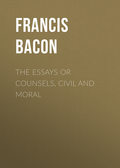
Фрэнсис Бэкон
The Essays
Of Building
Houses are built to live in, and not to look on; therefore let use be preferred before uniformity, except where both may be had. Leave the goodly fabrics of houses, for beauty only, to the enchanted palaces of the poets; who build them with small cost. He that builds a fair house, upon an ill seat, committeth himself to prison. Neither do I reckon it an ill seat, only where the air is unwholesome; but likewise where the air is unequal; as you shall see many fine seats set upon a knap of ground, environed with higher hills round about it; whereby the heat of the sun is pent in, and the wind gathereth as in troughs; so as you shall have, and that suddenly, as great diversity of heat and cold as if you dwelt in several places. Neither is it ill air only that maketh an ill seat, but ill ways, ill markets; and, if you will consult with Momus, ill neighbors. I speak not of many more; want of water; want of wood, shade, and shelter; want of fruitfulness, and mixture of grounds of several natures; want of prospect; want of level grounds; want of places at some near distance for sports of hunting, hawking, and races; too near the sea, too remote; having the commodity of navigable rivers, or the discommodity of their overflowing; too far off from great cities, which may hinder business, or too near them, which lurcheth all provisions, and maketh everything dear; where a man hath a great living laid together, and where he is scanted: all which, as it is impossible perhaps to find together, so it is good to know them, and think of them, that a man may take as many as he can; and if he have several dwellings, that he sort them so that what he wanteth in the one, he may find in the other. Lucullus answered Pompey well; who, when he saw his stately galleries, and rooms so large and lightsome, in one of his houses, said, Surely an excellent place for summer, but how do you in winter? Lucullus answered, Why, do you not think me as wise as some fowl are, that ever change their abode towards the winter?
To pass from the seat, to the house itself; we will do as Cicero doth in the orator's art; who writes books De Oratore, and a book he entitles Orator; whereof the former, delivers the precepts of the art, and the latter, the perfection. We will therefore describe a princely palace, making a brief model thereof. For it is strange to see, now in Europe, such huge buildings as the Vatican and Escurial and some others be, and yet scarce a very fair room in them.
First, therefore, I say you cannot have a perfect palace except you have two several sides; a side for the banquet, as it is spoken of in the book of Hester, and a side for the household; the one for feasts and triumphs, and the other for dwelling. I understand both these sides to be not only returns, but parts of the front; and to be uniform without, though severally partitioned within; and to be on both sides of a great and stately tower, in the midst of the front, that, as it were, joineth them together on either hand. I would have on the side of the banquet, in front, one only goodly room above stairs, of some forty foot high; and under it a room for a dressing, or preparing place, at times of triumphs. On the other side, which is the household side, I wish it divided at the first, into a hall and a chapel (with a partition between); both of good state and bigness; and those not to go all the length, but to have at the further end, a winter and a summer parlor, both fair. And under these rooms, a fair and large cellar, sunk under ground; and likewise some privy kitchens, with butteries and pantries, and the like. As for the tower, I would have it two stories, of eighteen foot high apiece, above the two wings; and a goodly leads upon the top, railed with statuas interposed; and the same tower to be divided into rooms, as shall be thought fit. The stairs likewise to the upper rooms, let them be upon a fair open newel, and finely railed in, with images of wood, cast into a brass color; and a very fair landing-place at the top. But this to be, if you do not point any of the lower rooms, for a dining place of servants. For otherwise, you shall have the servants' dinner after your own: for the steam of it, will come up as in a tunnel. And so much for the front. Only I understand the height of the first stairs to be sixteen foot, which is the height of the lower room.
Beyond this front, is there to be a fair court, but three sides of it, of a far lower building than the front. And in all the four corners of that court, fair staircases, cast into turrets, on the outside, and not within the row of buildings themselves. But those towers, are not to be of the height of the front, but rather proportionable to the lower building. Let the court not be paved, for that striketh up a great heat in summer, and much cold in winter. But only some side alleys, with a cross, and the quarters to graze, being kept shorn, but not too near shorn. The row of return on the banquet side, let it be all stately galleries: in which galleries let there be three, or five, fine cupolas in the length of it, placed at equal distance; and fine colored windows of several works. On the household side, chambers of presence and ordinary entertainments, with some bed-chambers; and let all three sides be a double house, without thorough lights on the sides, that you may have rooms from the sun, both for forenoon and afternoon. Cast it also, that you may have rooms, both for summer and winter; shady for summer, and warm for winter. You shall have sometimes fair houses so full of glass, that one cannot tell where to become, to be out of the sun or cold. For inbowed windows, I hold them of good use (in cities, indeed, upright do better, in respect of the uniformity towards the street); for they be pretty retiring places for conference; and besides, they keep both the wind and sun off; for that which would strike almost through the room, doth scarce pass the window. But let them be but few, four in the court, on the sides only.
Beyond this court, let there be an inward court, of the same square and height; which is to be environed with the garden on all sides; and in the inside, cloistered on all sides, upon decent and beautiful arches, as high as the first story. On the under story, towards the garden, let it be turned to a grotto, or a place of shade, or estivation. And only have opening and windows towards the garden; and be level upon the floor, no whit sunken under ground, to avoid all dampishness. And let there be a fountain, or some fair work of statuas, in the midst of this court; and to be paved as the other court was. These buildings to be for privy lodgings on both sides; and the end for privy galleries. Whereof you must foresee that one of them be for an infirmary, if the prince or any special person should be sick, with chambers, bed-chamber, antecamera, and recamera joining to it. This upon the second story. Upon the ground story, a fair gallery, open, upon pillars; and upon the third story likewise, an open gallery, upon pillars, to take the prospect and freshness of the garden. At both corners of the further side, by way of return, let there be two delicate or rich cabinets, daintily paved, richly hanged, glazed with crystalline glass, and a rich cupola in the midst; and all other elegancy that may be thought upon. In the upper gallery too, I wish that there may be, if the place will yield it, some fountains running in divers places from the wall, with some fine avoidances. And thus much for the model of the palace; save that you must have, before you come to the front, three courts. A green court plain, with a wall about it; a second court of the same, but more garnished, with little turrets, or rather embellishments, upon the wall; and a third court, to make a square with the front, but not to be built, nor yet enclosed with a naked wall, but enclosed with terraces, leaded aloft, and fairly garnished, on the three sides; and cloistered on the inside, with pillars, and not with arches below. As for offices, let them stand at distance, with some low galleries, to pass from them to the palace itself.
Of Ceremonies, And Respects
He that is only real, had need have exceeding great parts of virtue; as the stone had need to be rich, that is set without foil. But if a man mark it well, it is, in praise and commendation of men, as it is in gettings and gains: for the proverb is true, That light gains make heavy purses; for light gains come thick, whereas great, come but now and then. So it is true, that small matters win great commendation, because they are continually in use and in note: whereas the occasion of any great virtue, cometh but on festivals. Therefore it doth much add to a man's reputation, and is (as Queen Isabella said) like perpetual letters commendatory, to have good forms. To attain them, it almost sufficeth not to despise them; for so shall a man observe them in others; and let him trust himself with the rest. For if he labor too much to express them, he shall lose their grace; which is to be natural and unaffected. Some men's behavior is like a verse, wherein every syllable is measured; how can a man comprehend great matters, that breaketh his mind too much, to small observations? Not to use ceremonies at all, is to teach others not to use them again; and so diminisheth respect to himself; especially they be not to be omitted, to strangers and formal natures; but the dwelling upon them, and exalting them above the moon, is not only tedious, but doth diminish the faith and credit of him that speaks. And certainly, there is a kind of conveying, of effectual and imprinting passages amongst compliments, which is of singular use, if a man can hit upon it. Amongst a man's peers, a man shall be sure of familiarity; and therefore it is good, a little to keep state. Amongst a man's inferiors one shall be sure of reverence; and therefore it is good, a little to be familiar. He that is too much in anything, so that he giveth another occasion of satiety, maketh himself cheap. To apply one's self to others, is good; so it be with demonstration, that a man doth it upon regard, and not upon facility. It is a good precept generally, in seconding another, yet to add somewhat of one's own: as if you will grant his opinion, let it be with some distinction; if you will follow his motion, let it be with condition; if you allow his counsel, let it be with alleging further reason. Men had need beware, how they be too perfect in compliments; for be they never so sufficient otherwise, their enviers will be sure to give them that attribute, to the disadvantage of their greater virtues. It is loss also in business, to be too full of respects, or to be curious, in observing times and opportunities. Solomon saith, He that considereth the wind, shall not sow, and he that looketh to the clouds, shall not reap. A wise man will make more opportunities, than he finds. Men's behavior should be, like their apparel, not too strait or point device, but free for exercise or motion.
Of Counsel
The greatest trust, between man and man, is the trust of giving counsel. For in other confidences, men commit the parts of life; their lands, their goods, their children, their credit, some particular affair; but to such as they make their counsellors, they commit the whole: by how much the more, they are obliged to all faith and integrity. The wisest princes need not think it any diminution to their greatness, or derogation to their sufficiency, to rely upon counsel. God himself is not without, but hath made it one of the great names of his blessed Son: The Counsellor. Solomon hath pronounced, that in counsel is stability. Things will have their first, or second agitation: if they be not tossed upon the arguments of counsel, they will be tossed upon the waves of fortune; and be full of inconstancy, doing and undoing, like the reeling of a drunken man. Solomon's son found the force of counsel, as his father saw the necessity of it. For the beloved kingdom of God, was first rent, and broken, by ill counsel; upon which counsel, there are set for our instruction, the two marks whereby bad counsel is for ever best discerned; that it was young counsel, for the person; and violent counsel, for the matter.
The ancient times, do set forth in figure, both the incorporation, and inseparable conjunction, of counsel with kings, and the wise and politic use of counsel by kings: the one, in that they say Jupiter did marry Metis, which signifieth counsel; whereby they intend that Sovereignty, is married to Counsel: the other in that which followeth, which was thus: They say, after Jupiter was married to Metis, she conceived by him, and was with child, but Jupiter suffered her not to stay, till she brought forth, but eat her up; whereby he became himself with child, and was delivered of Pallas armed, out of his head. Which monstrous fable containeth a secret of empire; how kings are to make use of their counsel of state. That first, they ought to refer matters unto them, which is the first begetting, or impregnation; but when they are elaborate, moulded, and shaped in the womb of their counsel, and grow ripe, and ready to be brought forth, that then they suffer not their counsel to go through with the resolution and direction, as if it depended on them; but take the matter back into their own hands, and make it appear to the world, that the decrees and final directions (which, because they come forth, with prudence and power, are resembled to Pallas armed) proceeded from themselves; and not only from their authority, but (the more to add reputation to themselves) from their head and device.
Let us now speak of the inconveniences of counsel, and of the remedies. The inconveniences that have been noted, in calling and using counsel, are three. First, the revealing of affairs, whereby they become less secret. Secondly, the weakening of the authority of princes, as if they were less of themselves. Thirdly, the danger of being unfaithfully counselled, and more for the good of them that counsel, than of him that is counselled. For which inconveniences, the doctrine of Italy, and practice of France, in some kings' times, hath introduced cabinet counsels; a remedy worse than the disease.
As to secrecy; princes are not bound to communicate all matters, with all counsellors; but may extract and select. Neither is it necessary, that he that consulteth what he should do, should declare what he will do. But let princes beware, that the unsecreting of their affairs, comes not from themselves. And as for cabinet counsels, it may be their motto, plenus rimarum sum: one futile person, that maketh it his glory to tell, will do more hurt than many, that know it their duty to conceal. It is true there be some affairs, which require extreme secrecy, which will hardly go beyond one or two persons, besides the king: neither are those counsels unprosperous; for, besides the secrecy, they conunonly go on constantly, in one spirit of direction, without distraction. But then it must be a prudent king, such as is able to grind with a handmill; and those inward counsellors had need also be wise men, and especially true and trusty to the king's ends; as it was with King Henry the Seventh of England, who, in his great business, imparted himself to none, except it were to Morton and Fox.
For weakening of authority; the fable showeth the remedy. Nay, the majesty of kings, is rather exalted than diminished, when they are in the chair of counsel; neither was there ever prince, bereaved of his dependences, by his counsel, except where there hath been, either an over-greatness in one counsellor, or an over-strict combination in divers; which are things soon found, and holpen.
For the last inconvenience, that men will counsel, with an eye to themselves; certainly, non inveniet fidem super terram is meant, of the nature of times, and not of all particular persons. There be, that are in nature faithful, and sincere, and plain, and direct; not crafty and involved; let princes, above all, draw to themselves such natures. Besides, counsellors are not commonly so united, but that one counsellor, keepeth sentinel over another; so that if any do counsel out of faction or private ends, it commonly comes to the king's ear. But the best remedy is, if princes know their counsellors, as well as their counsellors know them:
Principis est virtus maxima nosse suos.
And on the other side, counsellors should not be too speculative into their sovereign's person. The true composition of a counsellor, is rather to be skilful in their master's business, than in his nature; for then he is like to advise him, and not feed his humor. It is of singular use to princes, if they take the opinions of their counsel, both separately and together. For private opinion is more free; but opinion before others, is more reverent. In private, men are more bold in their own humors; and in consort, men are more obnoxious to others' humors; therefore it is good to take both; and of the inferior sort, rather in private, to preserve freedom; of the greater, rather in consort, to preserve respect. It is in vain for princes, to take counsel concerning matters, if they take no counsel likewise concerning persons; for all matters are as dead images; and the life of the execution of affairs, resteth in the good choice of persons. Neither is it enough, to consult concerning persons secundum genera, as in an idea, or mathematical description, what the kind and character of the person should be; for the greatest errors are committed, and the most judgment is shown, in the choice of individuals. It was truly said, optimi consiliarii mortui: books will speak plain, when counsellors blanch. Therefore it is good to be conversant in them, specially the books of such as themselves have been actors upon the stage.
The counsels at this day, in most places, are but familiar meetings, where matters are rather talked on, than debated. And they run too swift, to the order, or act, of counsel. It were better that in causes of weight, the matter were propounded one day, and not spoken to till the next day; in nocte consilium. So was it done in the Commission of Union, between England and Scotland; which was a grave and orderly assembly. I commend set days for petitions; for both it gives the sudtors more certainty for their attendance, and it frees the meetings for matters of estate, that they may hoc agere. In choice of committees; for ripening business for the counsel, it is better to choose indifferent persons, than to make an indifferency, by putting in those, that are strong on both sides. I commend also standing commissions; as for trade, for treasure, for war, for suits, for some provinces; for where there be divers particular counsels, and but one counsel of estate (as it is in Spain), they are, in effect, no more than standing commissions: save that they have greater authority. Let such as are to inform counsels, out of their particular professions (as lawyers, seamen, mintmen, and the like) be first heard before committees; and then, as occasion serves, before the counsel. And let them not come in multitudes, or in a tribunitious manner; for that is to clamor counsels, not to inform them. A long table and a square table, or seats about the walls, seem things of form, but are things of substance; for at a long table a few at the upper end, in effect, sway all the business; but in the other form, there is more use of the counsellors' opinions, that sit lower. A king, when he presides in counsel, let him beware how he opens his own inclination too much, in that which he propoundeth; for else counsellors will but take the wind of him, and instead of giving free counsel, sing him a song of placebo.
Of Cunning
We take cunning for a sinister or crooked wisdom. And certainly there is a great difference, between a cunning man, and a wise man; not only in point of honesty, but in point of ability. There be, that can pack the cards, and yet cannot play well; so there are some that are good in canvasses and factions, that are otherwise weak men. Again, it is one thing to understand persons, and another thing to understand matters; for many are perfect in men's humors, that are not greatly capable of the real part of business; which is the constitution of one that hath studied men, more than books. Such men are fitter for practice, than for counsel; and they are good, but in their own alley: turn them to new men, and they have lost their aim; so as the old rule, to know a fool from a wise man, Mitte ambos nudos ad ignotos, et videbis, doth scarce hold for them. And because these cunning men, are like haberdashers of small wares, it is not amiss to set forth their shop.
It is a point of cunning, to wait upon him with whom you speak, with your eye; as the Jesuits give it in precept: for there be many wise men, that have secret hearts, and transparent countenances. Yet this would be done with a demure abasing of your eye, sometimes, as the Jesuits also do use.
Another is, that when you have anything to obtain, of present despatch, you entertain and amuse the party, with whom you deal, with some other discourse; that he be not too much awake to make objections. I knew a counsellor and secretary, that never came to Queen Elizabeth of England, with bills to sign, but he would always first put her into some discourse of estate, that she mought the less mind the bills.
The like surprise may be made by moving things, when the party is in haste, and cannot stay to consider advisedly of that is moved.
If a man would cross a business, that he doubts some other would handsomely and effectually move, let him pretend to wish it well, and move it himself in such sort as may foil it.
The breaking off, in the midst of that one was about to say, as if he took himself up, breeds a greater appetite in him with whom you confer, to know more.
And because it works better, when anything seemeth to be gotten from you by question, than if you offer it of yourself, you may lay a bait for a question, by showing another visage, and countenance, than you are wont; to the end to give occasion, for the party to ask, what the matter is of the change? As Nehemias did; And I had not before that time, been sad before the king.
In things that are tender and unpleasing, it is good to break the ice, by some whose words are of less weight, and to reserve the more weighty voice, to come in as by chance, so that he may be asked the question upon the other's speech: as Narcissus did, relating to Claudius the marriage of Messalina and Silius.
In things that a man would not be seen in himself, it is a point of cunning, to borrow the name of the world; as to say, The world says, or There is a speech abroad.
I knew one that, when he wrote a letter, he would put that, which was most material, in the postscript, as if it had been a by-matter.
I knew another that, when he came to have speech, he would pass over that, that he intended most; and go forth, and come back again, and speak of it as of a thing, that he had almost forgot.
Some procure themselves, to be surprised, at such times as it is like the party that they work upon, will suddenly come upon them; and to be found with a letter in their hand, or doing somewhat which they are not accustomed; to the end, they may be apposed of those things, which of themselves they are desirous to utter.
It is a point of cunning, to let fall those words in a man's own name, which he would have another man learn, and use, and thereupon take advantage. I knew two, that were competitors for the secretary's place in Queen Elizabeth's time, and yet kept good quarter between themselves; and would confer, one with another, upon the business; and the one of them said, That to be a secretary, in the declination of a monarchy, was a ticklish thing, and that he did not affect it: the other straight caught up those words, and discoursed with divers of his friends, that he had no reason to desire to be secretary, in the declination of a monarchy. The first man took hold of it, and found means it was told the Queen; who, hearing of a declination of a monarchy, took it so ill, as she would never after hear of the other's suit.
There is a cunning, which we in England call, the turning of the cat in the pan; which is, when that which a man says to another, he lays it as if another had said it to him. And to say truth, it is not easy, when such a matter passed between two, to make it appear from which of them it first moved and began.
It is a way that some men have, to glance and dart at others, by justifying themselves by negatives; as to say, This I do not; as Tigellinus did towards Burrhus, Se non diversas spes, sed incolumitatem imperatoris simpliciter spectare.
Some have in readiness so many tales and stories, as there is nothing they would insinuate, but they can wrap it into a tale; which serveth both to keep themselves more in guard, and to make others carry it with more pleasure. It is a good point of cunning, for a man to shape the answer he would have, in his own words and propositions; for it makes the other party stick the less.
It is strange how long some men will lie in wait to speak somewhat they desire to say; and how far about they will fetch; and how many other matters they will beat over, to come near it. It is a thing of great patience, but yet of much use.
A sudden, bold, and unexpected question doth many times surprise a man, and lay him open. Like to him that, having changed his name, and walking in Paul's, another suddenly came behind him, and called him by his true name, whereat straightways he looked back.
But these small wares, and petty points, of cunning, are infinite; and it were a good deed to make a list of them; for that nothing doth more hurt in a state, than that cunning men pass for wise.
But certainly some there are that know the resorts and falls of business, that cannot sink into the main of it; like a house that hath convenient stairs and entries, but never a fair room. Therefore, you shall see them find out pretty looses in the conclusion, but are no ways able to examine or debate matters. And yet commonly they take advantage of their inability, and would be thought wits of direction. Some build rather upon the abusing of others, and (as we now say) putting tricks upon them, than upon soundness of their own proceedings. But Solomon saith, Prudens advertit ad gressus suos; stultus divertit ad dolos.







